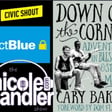Become a Creator today!Start creating today - Share your story with the world!
Start for free
00:00:00
00:00:01

Follow the Moneyball Episode 2 - Bob Nightengale
Transcript
Introduction to 'Follow the Money Ball'
00:00:07
Speaker
Welcome to Follow the Money Ball at the intersection of sports and money with a healthy dose of funny and irreverence, too. Here's your host, David Sloan. Hello, everybody. Welcome to Follow the Money Ball with
Meet Bob Nightingale
00:00:21
Speaker
David Sloan. My guest today is Bob Nightingale. Bob is the head baseball writer at USA Today for many years, and I am very pleased to have him on my show today. Hello, Bob.
00:00:31
Speaker
Thank you very much for joining me today. I always feel that it's best to start a story at the beginning.
Bob's Early Life and Love for Baseball
00:00:39
Speaker
And in addition to that, I've always been a fan of origin stories. So I'd like to go back to the beginning for you. You grew up where?
00:00:48
Speaker
Well, my dad was the Air Force. So we moved every three, four years. So primarily West and Midwest, but never at a place more than four years. Never lived in a baseball city. There's always military bases. So never a major state at all. Closest was at the Air Force Academy, which is just an hour short shy of Denver.
00:01:10
Speaker
Right. Very beautiful there. I would assume that your interest in sports developed the way it did for, for many of us. And that was, uh, as a young man, you played sports. Yeah, I did. And, uh, baseball your favorite. I liked them all. You know, baseball might've been at the beginning, but I played, you know, whatever was in season.
00:01:31
Speaker
My grandparents lived in Passaic, New Jersey, so we always go out there every summer. He would take me to Yankee games, take me to the horse tracks when he visited, and so he really got me into sports as well. So baseball wasn't necessarily your best sport, was it your favorite one?
00:01:47
Speaker
Yeah, it was one of my favorites. I remember studying the batting averages and stuff, looking forward to the Sunday paper when you could read who's leading the league and everything else. They never had batting averages in the paper, except for Sunday. So you always look forward to that Sunday paper and see who's actually leading the league. So yeah, I was kind of a Yankee fan just because I'm a grandparent.
00:02:08
Speaker
Well, interesting. I had a similar experience. I always read the papers here and watched the box scores and growing up in South Florida, there was no major league team back then. So it was whatever team you were able to get on the radio. And down here, that was either the Braves after they moved to Atlanta or the Yankees because this was such a big New York market.
00:02:30
Speaker
And also the Yankees back then had their spring training in Fort Lauderdale, which was, you know, not too far from where I grew up in Hollywood, Florida. And actually they had their minor league spring training in Hollywood. So I used to go over and watch them. So, uh, that was always interesting to see. So now, so you grew up all over the place and followed the sports all over the
Journalistic Journey Begins at ASU
00:02:51
Speaker
place. And then I understand that you went to a really good college. That was, uh, probably a great experience for where you having, uh, the opportunity to become a Sun Devil, correct?
00:03:00
Speaker
Yeah, the harbor or the west. There's no state. The southwest, exactly. Yes. No question about it. I know personally, having gone there as well, it was certainly the best job I ever had. It was a little easy to get distracted at times, especially during the spring, but it was a great place to go to school. That was for sure. There was a lot of things to do and a lot of opportunities as well. Now, was your major in college journalism?
00:03:24
Speaker
It was, it was. I started getting interested in journalism maybe around my junior year in high school, worked for the high school newspaper and say, you know what, it'd be fun to become a sports writer. And I was interested in all sports, it wasn't just baseball, it could have been NFL or NBA, what have you, colleges. But yeah, so in high school, I say, you know what, I think it would like to be a sports writer. So that's what led me, I might've gone to University of Colorado, but didn't have a journalism program.
00:03:52
Speaker
And so you know what, I went to ASU. My parents used to always come down for spring break, always enjoyed it. And that was a fun school, a good school, a great melting pot. It was just so much diversity at the college. I really enjoyed it. Absolutely no question about it. I know from my experience, I met kids from literally all walks of life. And my best friend, much like yourself, was an Air Force brat and lived in
00:04:20
Speaker
Arlington, Virginia, El Paso, Germany, and Seattle, and half a dozen other places.
00:04:28
Speaker
Where is it? Where were you in high school primarily? Did you move the years that you were in high school as well? I was in Albuquerque, New Mexico. My dad got stationed there after a Vietnam tour. And then moved to Denver just my senior year only. And then he ended up retiring from the Air Force and working governments and everything else. But my two younger sisters followed me to ASU. But yeah, they were much more entrenched in Denver than I was.
00:04:55
Speaker
And of course went back to Denver every summer for summer break. I understand. So you had Arizona surrounded.
00:05:02
Speaker
They're in New Mexico and Colorado. So you knew it at least a little bit before you got there. That's great. That's great. And the journalism school there is a very, very good journalism school. I have to say you are part of a very small group of people that I know who actually majored in what their career eventually wound up being in. My wife being one of them. My wife was majored in radio and broadcasting.
00:05:31
Speaker
And that is what she went into. Most people that I know of, they majored in whatever it was. And then when they got out of school, they went into whatever their career became. I know, speaking for myself, I majored in political science at Arizona State. And what I wound up doing as an agent for 44 years had absolutely nothing to do with political science. Although a lot of the skills from politics did kind of dovetail with the skills necessary to be an agent.
00:05:58
Speaker
So, you went to ASU and majored in journalism, you come out of ASU with your degree, and where was your first newspaper job?
Career Growth and Team Coverage
00:06:07
Speaker
Right at the local paper, the Arizona Republic in Phoenix, doing high schools, taking high school scores, moving my way up there, eventually ASU football. But yeah, that was my first job, right out of college. Was Tim Tyer still there, or Vern Boatner?
00:06:25
Speaker
Burn was the columnist for the Phoenix Gazette, but yeah, Burn Boettner was certainly there. Then took off from there and went to Kansas City Star to cover the Kansas City Royals. What year was that? So, for sure coming along. I helped out in 1985 with Tracie Ringlesby in the World Series and playoffs.
00:06:49
Speaker
covering baseball in a full-time beat was 1986. And a great team to be with just because the small market team and those guys, you know, taught me everything, you know, Al McRae, Frank White, George Brett, you know, Dan Quisenberry, you know, on and on, but just a great group of veteran guys to learn with. And with younger guys, too, that came up about the, you know, Brett Sabrehanging and Mark Yubiza, you know, those sort of guys, too, with Danny Tarle.
00:07:17
Speaker
Willie Wilson. Yeah, they hang out with them. Willie Wilson was more of the veteran type, yeah. So yeah, those days were different. I mean, took team planes occasionally, hung out at the hotel bars and different bars and ate together all the time. Right, right. And that organization, they were, I would assume, pretty friendly as far as the media was concerned, as opposed to some of the other organizations that tend to see the media in an adversarial relationship with the team.
00:07:45
Speaker
Yeah, it's almost like everybody's together. I remember on opening day was a big thing in the Kansas City, like it is a lot of smaller markets, but John Sherwell, the general manager, was actually in the street corners, passing out in the Kansas City Star newspaper. You know, you see, times are different back then. But yes, very close-knit.
00:08:04
Speaker
My first experience with John Schurholz, he was the assistant minor league director for the Royals. Lou Gorman was running their minor league department back then. I can't remember the name of the GM, but nonetheless, Gorman was running their minor league department. And I was representing their second round draft choice in 1975.
00:08:24
Speaker
Kid from Arizona by the name of Pat Gilly He wound up not signing and he wound up going to ASU and had some injury problems and his career never worked out But he was the the best Prospect in the state of Arizona that year the second best prospect was a guy you might have heard of who had a fairly decent majorly career Bobby Horner but Pat Gilly was the the top guy that year and it was kind of a
00:08:48
Speaker
a farce because back then players were not supposed to have agents and nonetheless there were many players that did have agents and Pat was one of them and
00:08:57
Speaker
It got to the point where it was a week or 10 days before ASU was going to start and the Royals would lose the rights to Pat. And Lou Gorman calls me up and he's got sure holds on the extension. He says, David, you know, we talked about, you know, what you were looking for for your client. He said, but we haven't received anything from you yet. Could you, you know, send us a memo as to exactly, you know, the signing bonus and Senate bonus in college money that you're looking for for your client? Oh, sure. I'll put it in the mail right away, Lou. No problem whatsoever.
00:09:27
Speaker
They were trying to get me to implicate my client in terms of having an agent. So needless to say, that letter never got sent. But nonetheless, as you know, Sher Holtz went on to bigger and better things with both the Royals and then obviously with the Braves. So he was destined for success. He managed to climb that corporate ladder pretty quickly. So you were with the Royals for covering the Royals for how many years?
00:09:50
Speaker
So yeah, I started full-time at 86, and I covered the Royals, then left in June of A-9 to the Los Angeles Times to go cover the San Diego Padres. I didn't know you'd work with the Times. Yeah, so cover the Padres for the Times, the Angels for the Times, and the Dodgers for the Times.
00:10:06
Speaker
before going to USA Today. The boundaries are a fun team too, just a, you know, small market, Tony, Gwen and those guys. So same thing, a real fun group to be around. Yeah. Randy Jones and, oh God, can you remember what was the name of the captain? Yeah, Cliff Leffert, Gary Templeton. Of course, when I was there, Fred McGriff came in, Gary Sheffield came in. So yeah, some very, very good players. Gary, if I'm not starting, I'm not the part in Templeton.
00:10:41
Speaker
I tried to recruit Gary, tried very hard. He had played against one of my roommates from ASU in the Texas league. And that particular gentleman, Gary Atwell, who started in center field for four years at ASU said, flat out, this is the single best athlete I'd ever seen in my life. And, you know, Gary was a number one football recruit for ASU that year. Oh, I know that. Yeah.
00:11:04
Speaker
Yeah, he was, he was arguably the best wide receiver prospect in the state of California his senior year in high school in Santa Ana, which he was a very fast runner and a great athlete. So obviously that would make sense that he would have those kinds of skills.
00:11:20
Speaker
you know, when the Cardinals drafted him in the first round and offered him some money, his family had a really difficult situation. His father, they were from Ohio, I think Akron, and his father had worked for BF Goodrich for many, many years. And it was just before he was supposed to have his pension vested and, you know, he was going to retire with full pension and they laid him off. So he didn't get that pension money and it really set his family back. And then shortly after that,
00:11:48
Speaker
Gary moved to California. And again, as they say, the rest is history. So you're with the Times, which had to be an interesting experience. I mean, a giant city newspaper like that. And they had, back then, I'm sure an extensive staff of writers, some of whom no doubt are still around these days. And that must have been a tremendous learning experience. So Tracy Ringlesby, I knew Tracy from when he worked for the Long Beach Press Telegram.
00:12:18
Speaker
covering the Angels and I had several clients on the Angels back then. Very nice man, very good writer. Would you say that in those years, either in Kansas City
Mentorship and Career Influence
00:12:27
Speaker
with the Star or in Los Angeles with the Times that you had anyone who might be described as a mentor or with anywhere else, any other people that you knew that you would describe necessarily as a mentor? Certainly Tracy. He is number one by far. He is one who talked me into covering baseball with him. Really?
00:12:46
Speaker
How did that conversation go? You were writing for paper or what? You were on the table as to which way you were going to go?
00:12:56
Speaker
Yeah, I went to Kansas City. I was doing some college football. I was doing an NBA for that year. It was fun. And I didn't say you lost touch at baseball, but that wasn't comfortable. And he said, no, you don't like it. The people in the game are great. Treat your respect. I'll treat your respect back. And sure enough, after a few months, I learned to love the people in the game and what it was all about.
00:13:20
Speaker
It never stopped. But, yeah, Tracy taught me the work ethic and everything else to do the job the way it's supposed to be. And I still fall out to this day. I mean, still, when I'm at the first gate of the ballpark, you know, one of the first, and when the clubhouse is open, I'm in there. But all that, you know, keeping stats, that's all I'll do to Tracer Reynolds.
00:13:38
Speaker
Interesting. Interesting. Well, that's very much an old school approach. Now, would you not agree? It would seem that a lot of the younger writers tend to my impression of it. And please correct me if you disagree. My impression of it is that a lot of the newer writers seem to rely extensively on
00:14:00
Speaker
what they're reading online and reacting to that. It's a very similar shift that I perceive that took place in baseball front offices where, you know, back in the day, they relied on what they saw with their eyes and now they rely what they see on a stat sheet.
00:14:19
Speaker
Yeah, absolutely. I mean, so much people looking at stats and numbers, which is amazing, because so many people don't even keep scoring more in the press box, which blows my mind. Seriously? Seriously? And just looking at computers, helping this guy do this since previous, I bet. It's wild. But yeah, so much is...
00:14:36
Speaker
done with stats. They don't get to know a person. I know it's hard to get to know people today. You're not drinking the hotel bar with them. But still, so many people don't know the human side or what makes a guy tick. Why is this guy great in the clutch? Why this guy
00:14:52
Speaker
is great when there's no pressure, you know, that sort of thing. So yeah, I think that's missing more before you really get to know a guy's personality and like I said, hang out with him and just know what makes him tick. We're not be able to just look at numbers and share numbers only.
00:15:09
Speaker
Well would you not agree that the sports business more or less has always been the relationship business because it's who you know and how you know them and you know in what depth that you know them so that as you say you know a bit of the guy's background and can
00:15:26
Speaker
ascertain from that what it is that makes it easier for him to function in pressure situations or you know, you know somebody well enough that maybe in the course of a conversation, they let you in on the fact that they're having some sort of, you know, their father sick or, you know, their wife's expecting or something like that. And that's on their mind when they go up to the plate.
00:15:49
Speaker
Yeah, absolutely. That's going through mental problems or what have you. Like you said, sick kids or something like that. But yeah, I think that's missing where everything just straight on the analytic side and how a guy performs or going strictly by the numbers and not what a guy does or what he means to a team winning. You know, there's debate a member a year ago, who's the MVP Aaron Judge or Shohei Otani? So Aaron Judge led his team to playoffs, obviously broke a home run record.
00:16:17
Speaker
But you look at now, I mean, look at the Yankees without Aaron Judge. And right now, they're 20 and 27 when he doesn't play. That's an MVP. I mean, he makes those guys a playoff team when he plays. When he doesn't play, they stink. So to me, that's what a real survival player is.
00:16:32
Speaker
Well, whereas Otani until recently has been healthy the entire years and the Angels still aren't a great team, even with him and Trout. Right, right. And that's no knock on Otani. He's a great player. There's no question about it. He's a great player, but using the benchmark that you're talking about in terms of the Yankees with Judge as opposed to the Yankees without Judge versus the Angels with Otani and they're not, you know, anywhere near the Yankees with Aaron Judge.
00:16:58
Speaker
Yeah, it should just be about the numbers. You know, going back, you remember, Ms. David, the 88, Darrell Strawberry had easily the best numbers of Avon in the National League. Kirk Gibson won the MVP award because of what he meant to that franchise, lifting one at the top. Same with Terry Pelleton, when he got the Braves in the playoffs in 91, you know, Bonds had much better numbers, but Pelleton was a different maker for that team. So now it seems like people ignore that.
00:17:25
Speaker
Yes, it's a lot more of what's this picture spin rate, what's this hitter's exit velocities, and those sorts of things.
00:17:33
Speaker
They tend to, in my opinion, focus on those as main issue as opposed to an adjunct, a tool in order to analyze what makes a player great because there are so many other things that make a player great other than spin rate, exit velocity, things like that. There's also intangibles and Gibson's a great example of that. I mean, the guy had tools coming out his ears, but nonetheless, in my opinion, and again,
00:18:01
Speaker
I was fortunate enough to see Kirk Gibson play in Des Moines, Iowa against a client of mine there that I went to visit. And they were playing, I believe it was the Evansville team was the Detroit farm club back then. And the thing that made Gibson the great player that he was, was the fact that he just.
00:18:21
Speaker
Refused to lose he would do whatever it took to win a game If it was coming up with a big hit that he would do it if it was stealing a base He would do it if it was a defensive play he would do it He would do whatever it took to win a game and and there may have been people with greater exit velocity or what-have-you than he had but nobody had a stronger desire to win than Kirk Gibson and
00:18:43
Speaker
In that era, maybe there's somebody out there today, but in that era, Gibson to me was head and shoulders pretty much above almost anyone else. Yeah, absolutely. I mean, you see it, you know, different guys now, whether it's a Kyle Shorver, you know, type of player in Philadelphia and those guys, they'll just do anything possible to win, forget the stats.
Hall of Fame Induction Insights
00:19:04
Speaker
And I think, yes, I was so happy with the, particularly with Fred McGriffin, the Hall of Fame, you know, this weekend, Scott Roland, too, but they were gamers. I mean, it was about helping your team win. It wasn't saying, okay, look, you know, look at me, look at me, and say, what can I do to help my team win that night? Right. Right. 100%. And those are both guys that had tremendous respect.
00:19:26
Speaker
from other players that were their peers as well, in addition to putting up great numbers and also in the respective clubhouses that they played in. Bob, you've been in the game for a long time and seen a lot of changes.
Challenges in Modern Baseball
00:19:43
Speaker
What would you characterize as the biggest challenge going forward in terms of that baseball has to face? And I would break that down into
00:19:55
Speaker
the challenge from the sports side and the challenge from the players side. I have my opinions and I'd be glad to share those, but I'd really like to hear yours. On the sports side, I'd just like to get back to where it was for scouting and development and not just sheer numbers. You can't just throw numbers on a piece of paper. All you have to do is look at the San Diego Padres.
00:20:19
Speaker
They don't make the playoffs if we go down as the most underachieving baseball team of all time. But you just can't throw a bunch of talent in the room expecting to win without constructing the roster right, having a deep bench, that sort of thing. And I think way too often, you know, we all get caught up, you know, talking about writers and media and who wins the winner. I mean, how many times does a team win the winner and just, you know, stinks in the summer? You know, we fall in love with that, you know.
00:20:46
Speaker
Look, you know, every game is so excited about all the money that Mets are spending, the Padres are spending. Yankees, you know, look where they are right now. The season, you know, season ends. They're not in the playoffs, but yet three or four of the bottom teams in revenue and payroll will be in the playoffs. But I think, yeah, what we're missing or ignoring is just heart and desire and what makes a guy tick. I would say from my perspective, the most important thing from the team's point of view
00:21:14
Speaker
is you have to assemble a
00:21:17
Speaker
player development factory. One of my former clients is a gentleman by the name of Mitch Lukavix. And I was supposed to actually interview Mitch last week, but something came up and he couldn't make it the day we were going to get together. And then his anniversary evidently, he and his wife were taking a trip for their anniversary. So I'll probably be talking to Mitch next week. But one of the things that I, you know, I'm most interested in talking to Mitch about was the fact that he's been a huge, huge factor and a very unknown factor.
00:21:47
Speaker
in regard to the player development factory that the Tampa Bay Rays have assembled. And before that, he got his start in player development with the Yankees. I represented Mitch when he was with the White Sox. And Mitch got up to AAA as a pitcher out of Penn State. You know, he was just a little bit short. You know, in those days, there were no radar guns, so he probably would have been
00:22:10
Speaker
High 80s, regularly low 90s, maybe top out around 91, 92, but in terms of player development, he's been one of the best. And to me, what you're talking about is exactly that in terms of the means winning the winter.
00:22:24
Speaker
Yeah, you can sign Berlander, you can sign Scherzer, you can sign this guy or that guy or trade for somebody else that a team's trying to dump their salary. But if you've got a, a Wonder Franca, uh, coming up from the minor leagues who you know is a great talent and you're able to work him into your lineup and he contributes every day in the big leagues the same way that he had in the minors.
00:22:46
Speaker
That's a tremendous benefit to you on two tracks. One, he's putting up great numbers for you on the field. And number two, he's saving you money because you're not having to pay him the same amount of money that, for example, Philadelphia is paying Trey Turner to have signed him as a free agent. So it's a double benefit when you have that kind of player pipeline that your own organization has developed. Would you not agree?
00:23:10
Speaker
Absolutely. I mean, Dodger's a big payroll, but they've done a great job developing. Great job. Maybe use one of those resources to help those young guys come up. Tampa does a wonderful job just in the makeup and character of players. I mean, how many players they bring in?
00:23:27
Speaker
who were nothing until they got there to become all-stars. And how many all-stars leave, that became nothing. Let's see it apart. I mean, just a magical formula there. And you talk to players, there are almost some tears when they get traded or leave Tampa because they enjoy it so much, just the environment, how comfortable they are, a close-knit organization.
00:23:48
Speaker
uh you know you know a few other examples but you don't get like david prize is really one of the few guys that leaves tamper and they're still good it seems like everybody else is going to fall apart yeah they do a great job there and they have for
00:24:01
Speaker
For most of their existence, what was the guy's name? Vince Nimoli. Once he sold the team, it seemed to really take off. And again, I take a little bit of pride in the fact that one of my former clients is directly involved in the success that they've had in developing the many players that they've had.
00:24:21
Speaker
So tell me something. In terms of covering, as you do on a national basis, how important is it to maintain access, not just to players, but also the Major League executives and also to player agents?
Evolving Sports Media Landscape
00:24:39
Speaker
And specifically what I'm talking about is
00:24:42
Speaker
Is there a barrier, let's call it, to you? You see a team like San Diego and they sign a guy like Tatis for a big, big deal like the one he got. And you look at it and you say, well, yeah, that's a great deal if it works out. But if it doesn't work out, you guys are screwed for the next 13 years or what have you.
00:25:09
Speaker
Is there a barrier to you being able to say that for fear that by saying it, you lose access to AJ Preller or the people in the San Diego front office?
00:25:22
Speaker
and it's more much more prevalent today than several uh... i think that you look at the uh... me in general i mean in general is much softer for the reasons you said david in that you start bearing someone you're not going to access so instead of you be the only game in town they all turn to uh... competition and you know i'll give everything to that guy cuz he's not critical of me so i i think we see that that an awful lot
00:25:49
Speaker
uh you know i think outside outside boston a little bit of philadelphia you know i think you know the rest of markets are just uh not saying they're all cheering for their team but you know they're not critical either and i think the problem too is in today's
00:26:04
Speaker
Media age and everything goes by you know clicks so many times the story reading So it's almost you find the beat writers almost rooting for their teams because people are gonna read about a winner much more than a loser and We've seen layoffs and you know, New York Times sitting down their sports section things like that just you know a scary thing but you know, I don't blame these particularly beat writers from room for their team to win because more more people read their stories and
00:26:31
Speaker
Yeah. Do you think that management has become more thin skinned or could it be the fact that there, for example, when you were with the times covering the Dodgers, Angels and Padres, you were the only game in town. It wasn't like Buzzy Bevesi when he was with the Padres being able to go to a outlet, like for example, the athletic.
00:26:51
Speaker
Or bar stool sports or dead spin or one of these online publications and get his story out that way he either had to give the story to you or to the san diego paper basically there was no one else that. That provided an outlet but now there's nine million different.
00:27:09
Speaker
I mean, even people like me with nothing but a microphone can criticize a deal as opposed to, you know, the actual newspaper that covers the various teams. Yeah. When you say that the MLB network, you know, MLB radio, I think on newspapers, but everybody is just kind of much shocker just to get that access. If you're burying someone, say your MLB network, you're not going to get that guy that ever come on the air and do anything for you. So,
00:27:37
Speaker
Yeah, it was different back, you know, like the LA Times, but you know, it's got the angels and Dodgers, there were like seven or eight different papers covering it. But the Times was so huge and circulation everything else. It was like, you know, the only game in town as far as that people cared about as far as a front office like, okay,
00:27:54
Speaker
If the times is positive, and so does everybody else, I don't care about the times. If the times is negative and everybody else is positive, they're upset with the times, but there's more to get back in a good race. It's like, okay, I'm not going to hold a grudge because that paper is too powerful of a voice.
00:28:11
Speaker
a little bit like the Chicago Tribune or New York Post now, you know, that sort of thing. But there's very few papers now that still have late deadlines that, you know, care about, you know, getting scores in and that, you know, do it right, frankly. But even print the box scores. I mean, here locally, the newspapers here that cover the Marlins, first of all, Marlins hardly ever get a front page story.
00:28:35
Speaker
Right now today, I mean the Fort Lauderdale paper, the front page story is all about Lionel Messi and the Dolphins. And the Marlins are actually in the hunt for a playoff spot for one of the few times in recent history. And the closest they're going to get is page two or three. And I know back
00:28:54
Speaker
In the 70s or 80s, for example, I had half a dozen clients on the angels. And the difference between a story in the Times or a story in the Orange County Register was night and day. The ball club, the front office was much more concerned with what the Times was printing as opposed to the Orange County Register, even though there's a case to be made that the Orange County Register was the hometown paper. And then you had the Long Beach paper as well.
00:29:22
Speaker
The Long Beach paper and the Orange County paper didn't amount to the amount of emphasis that was placed on what the Times was writing. Yeah, absolutely. You know, same as when I was there. You know, the Times just announced, you know, no more game stories, no more backstories, nothing.
00:29:37
Speaker
they had three o'clock deadlines. The St. Pete paper they told me at the All-Star game, they only published two days a week now. But yeah, we're getting more and more like that. That's horrible. Yeah, there's only a few, less than a handful of papers that you can still get, you know, game stories on the paper, box scores, you know, regular game stories with quotes, and everybody else is just writing a day ahead and you pick up the paper, there's nothing in there.
00:30:02
Speaker
Yeah, true. Well, down here again, the Miami Herald, they only publish six days a week. They don't publish on Saturday. And what used to be the best paper in the state of Florida is now it's a pamphlet. It's like something that you would see for not a high school paper. It's a little bit beyond that, but more like the Arizona state press. You remember that back at ASU, it's a little bit more extensive than the Arizona state press.
00:30:26
Speaker
How about the players? I mean, obviously, you've seen some change. I know I saw it from my side as an agent. Do you think the players are more thin-skinned in terms of if you write something critical of them that they may not talk to you again? Yeah, much more thin-skinned. I'm going to say, we'll talk to you again, but much more thin-skinned than ever.
00:30:46
Speaker
I think players all the way up through management, just a different world. And it's almost like, hey, if you don't do that, I can go to social media, especially myself. I'll go to some other website, tell radio station, what have you. But no, I think before, I think the players took it. They may not have liked it. But hey, no grudge. Everybody's got a job to do. But now it's a different animal because when someone's negative or critical,
00:31:14
Speaker
it just jumps out so much because you don't see it anywhere yes no question about it and i don't think there were many players back in the day that ever really liked it there were a few that were really good with the press but most of them i know from experience with with most of my clients their opinion was that
00:31:33
Speaker
The average sports writer was more interested in writing a negative story about them because it got more notice for the writer as opposed to writing a positive story about a particular player. Do you think the prevailing sentiment still, or do you think things have changed? I still think the negativity sells, or just one negative thing.
00:31:53
Speaker
no you could have a manager praising a player for thirty minutes nonstop he says one negative word about the guy. And that's the headline you know people are clicking on the story and things like that were before i think it might be the whole negative story now i just you know one little negative thing will controversial thing.
00:32:11
Speaker
you know, blows up, you know, someone blows up a kid for autographs, there's a little exchange, you know, that's become, you know, huge headlines. So, you know, that's why, you know, a lot of these players trying to go out into more. I mean, they go straight back to their room, play video games, everything else. I hardly ever see any players out these days. But no, it's just, it's different. I mean, the only thing that goes on the internet now is if something, you know, 95% of it is something negative, not a filled with story.
00:32:37
Speaker
Yeah. Do you think that, uh, that at least in part, it's because of the massively increased amount of money in the game these days in terms of what the players are making versus what it was, say 10, 20 years ago? I'm not sure about that. Even though the money is so much greater now, you know, even then, but you know, Oh man, this guy's making a hundred thousand, you know, you know, this guy's making a million dollars. He's still jumped out just because of so much more than the, uh, you know,
00:33:04
Speaker
average income. I mean, nowadays, I think you almost become immune to it. The guy's making $15 million a year. It's like he's making 45 a year. It's like no difference. So I don't think the money part, the big contracts, the long-term contracts can play a factor, but not how much the guy's making per year. Well, another thing that I've taken note of
00:33:28
Speaker
Particularly over the last I'd say three to five years. I had clients back in the day in the late 70s for example guys that were hitting well over 300 in the Pacific Coast League could not sniff the big leagues or a pitcher that you know Consistently put up great numbers in the American Association couldn't sniff the big leagues
00:33:49
Speaker
Now you got guys that are being called up from the minors who, you know, they're saying, Oh, this guy hit two 70 in triple A. I'm seeing this and I'm thinking in 1980, this guy wouldn't have ever seen a big league game unless he bought a ticket or one of his former teammates left him a ticket. It's just mind boggling. Now, that being said, many of these players, they get to the big leagues and they perform well, but it's just that aspect of the game has changed so much as well. Would you agree?
00:34:15
Speaker
no absolutely i mean they're bringing guys up all the time there aren't ready or any closer ready uh... men that kid a couple years ago david a piece of iris first baseman i think i'll be bias you know you know i'm going to first he's trying to tag him out is it is your touching the first baseband so let's get into our home the guy from third base you know scores a run the guy so closer that you know bias so i guess a basic runs but just
00:34:42
Speaker
You see way too many that thing, too much of that when guys don't know the fundamentals because they're getting rushed. Teams just use that waiver wire or option guys right and left. You have a couple of bad games, you're back in the minors. If you pitch great relief, you can't use it because you threw five innings, you're down the minors. Right. As opposed to guys like you remember Randy Bass or Steve Balboni who had
00:35:10
Speaker
half a dozen great years in AAA and didn't get called up. And when he finally got called up, he was 28, 29, 30 years old, and still had a few decent years in the big leagues. Whereas nowadays, a guy like Randy Bass, who I believe had a whole bunch of years where he had 25, 30 home runs in the minors, they're calling him up in a heartbeat and seeing what he can do in the big league. Yeah. I covered Balboni with the Royals. So I'm afraid he was the best team leader I've ever seen.
00:35:39
Speaker
So he would give a bottle of Dom Perion to ever struck out a hundred times in a season. And, you know, just to kind of rev them, but in a good nature way. And Balbonia was always, you know, like, okay, it happened and if it didn't happen, it's going to happen. It's going to happen mid to late September or not at all. Nowadays, these guys have a hundred strikeouts by the end of May.
00:36:00
Speaker
Yeah, yeah, that's right. No question about it.
The Impact of Gambling in Baseball
00:36:03
Speaker
In terms of challenges for the game going forward, how big a factor do you see gambling being? Because to me, the hypocrisy of baseball continuing to ban Pete Rose while they're getting paid by FanDuel is just as stark a contrast as I think it's possible to see.
00:36:24
Speaker
And I don't see it being a situation where it's going to compromise necessarily the integrity of the game, but there's so much going on now where
00:36:36
Speaker
fans are able to watch a game and practically literally bet on whether the next pitch is a curve ball or a fastball. And that being said, it has to influence not necessarily outcomes, but the way that the game is viewed by the fans as something to bet on as opposed to a team to root for. Yeah, I think it opens up Pandora's backs for sure. And we've already seen what four or five
00:37:02
Speaker
you know, scandals in NFL with players, you know, betting on football games. We haven't seen it yet in baseball, but it's common. Whether it's, you know, the clubhouse attendance knows so much information, the trainers and on and on, there's going to be some scandals in baseball over that kind of stuff. And you're right about, you know, it just, you know, guys are going to pretty soon start getting death threats. Players associations worried about that.
00:37:27
Speaker
Uh, so the umpire say, you know what, if you want to bring an automated strike zone, that's fine. I don't want, uh, I don't want people calling my home because I missed a push of calling the night didn't, and they think I'm going to take her something when I simply, you know, miss the pitch. It's like, okay, let the baseball handle that strike zone.
00:37:44
Speaker
Yeah. Yeah. It might be a lousy umpire, but that doesn't justify a death threat. Yeah. Just, you know, just the, uh, you know, people think, Oh, he must be in a tank. Cause look at all these calls he missed, you know, that sort of thing. But yeah, I mean, it's going to, it's going to happen with the, uh, with scandals. I mean, there's too much information that's being cloaked inside now with clubhouse attendance, trainers, support staff, PR, you know, what, what have you say? Hey, I'll call my buddy up, give him a tip and let him bet on it.
00:38:13
Speaker
Well, and, and, and it happened in college baseball. You, you probably are aware of what happened with the coach at the university of Alabama. Right. Right. Yeah. Something like that. I mean, I think, I mean, naive, I think it's not going to be happening in baseball. I'm not saying it happened yet, but very well could. We don't know. I mean, especially, you know, when COVID was going on, every, you know, the trainers, uh, the people inside knew who was going on the COVID list, who wasn't available, you know, that sort of thing. Yeah.
00:38:39
Speaker
Yeah, well, with the massive amount of money that, you know, points bet, like I said, FanDuel, all of these different gambling sites, the amount of money that's involved there, it's just, I think, ripe for some sort of scandal to occur. I know that you deal with the Major League side of baseball primarily, but I also know that you from time to time cover issues in guard who
00:39:08
Speaker
exceptional minor league prospects as well as the draft and college baseball being a bigger factor now than it used to
NIL Deals and College Baseball
00:39:17
Speaker
be. Do you see the changes in college sports with name, image and likeness money, do you see that becoming a factor at any point in the near future?
00:39:29
Speaker
Oh, I do. And I think what's going to happen, because particularly college football is so big in that. It's like if you're a good athlete and you get that kind of money through the NILs for college football, why in the world would you play baseball? You're going to go through the big money, yes. We were talking 100 Green this past spring. And he was the number one prospect in the country, amateur player in the country. He said the best scholarship offer he got was from UCLA. I think it was just a half a ride, maybe three quarters of a ride.
00:39:58
Speaker
but wasn't a full ride. And so I think the other sports, particularly football and basketball can really separate themselves from college baseball because of that money you're talking about. Well, and that I think is the fault more of the fact that baseball is limited to 11 and a half scholarships a year. So they have to divvy that up among 20 some guys. I think that it's going to influence it more from the other side of things because
00:40:22
Speaker
College baseball, again, I can remember when I was at ASU, ASU had arguably the most talent of any baseball team in the country. They didn't necessarily win the NCAA championship every year for one reason or another, but they produced so many guys that went into pro ball that had great careers. And back then, guys weren't allowed to get anything, but they were still on full scholarship.
00:40:47
Speaker
Now, what I see compared to back then, you would see at ASU baseball games back then, you'd see 250, 500 people maybe. If it was a big game where it was ASU against U of A and they were playing at Phoenix Muni Stadium instead of playing on the on-campus field, maybe you'd get 1,000, 1,500, couple of thousand tops if it was a big, big game like that kind of rivalry. Now you see these colleges expanding their facilities to the point where
00:41:15
Speaker
they're building stadiums that seat 5,000 people routinely, and they're drawing 5,000 people routinely. I'm wondering if it isn't going to get to the point where if a kid is strictly baseball as opposed to a baseball football type of choice for a kid to make, and it's a kid who's trying to choose between a scholarship to school A as opposed to school B, and one is going to come to them and say, well, we've got this tremendous collective,
00:41:43
Speaker
that's putting up money for our football team, we're going to use some of that money for baseball and we're going to effectively buy up all the best baseball prospects in the country. Do you think there's a chance of that happening? Well, absolutely. I can see that. A lot of these good baseball players are good in other sports too, and vice versa. We saw that with the kid from
00:42:05
Speaker
Oklahoma, I grew up in Texas. He plays quarterback now for the Arizona Cardinals. Remember the Oakland A's draft? Oh, Murray, Kyler Murray. Yeah, Kyler Murray. The Oakland A's drafted him with the 10th pick. They say, we'll let you go to college one more year and then, you know, you sign the contract, you win the Heisman Trophy. See you later. I want to know a part of baseball. I can make a killing here in football right away.
00:42:30
Speaker
Yeah, guaranteed money. Guaranteed money speaks volumes. There's no question about it.
Closing Remarks and Future Plans
00:42:35
Speaker
Well, Bob, I'll tell you, we could go on for another hour or so, but I know you're busy. I really appreciate it. I'd really love to do this again sometime, and I hope you'd be amenable to coming back. Yeah, look forward to it. Yeah, thanks. I haven't enjoyed it.
00:42:47
Speaker
Bob Nightingale, make your baseball writer for USA Today. If you want to reach Bob, he's at bnightingale on Twitter or usatoday.com. If you want to reach me with any guest suggestions or comments, I'm at David M. Sloan on Twitter or follow themoneyball.substack.com. Thanks for listening.












